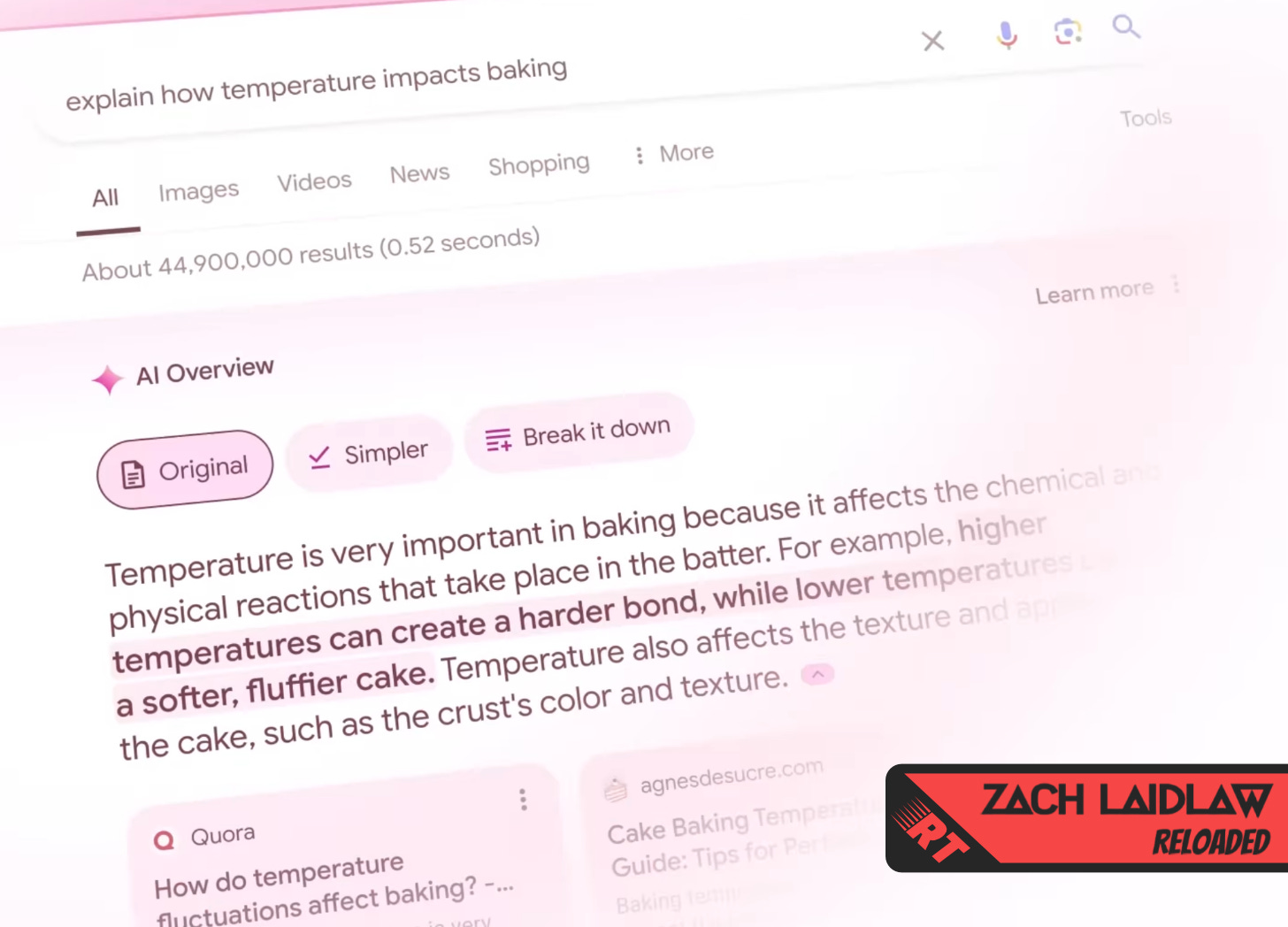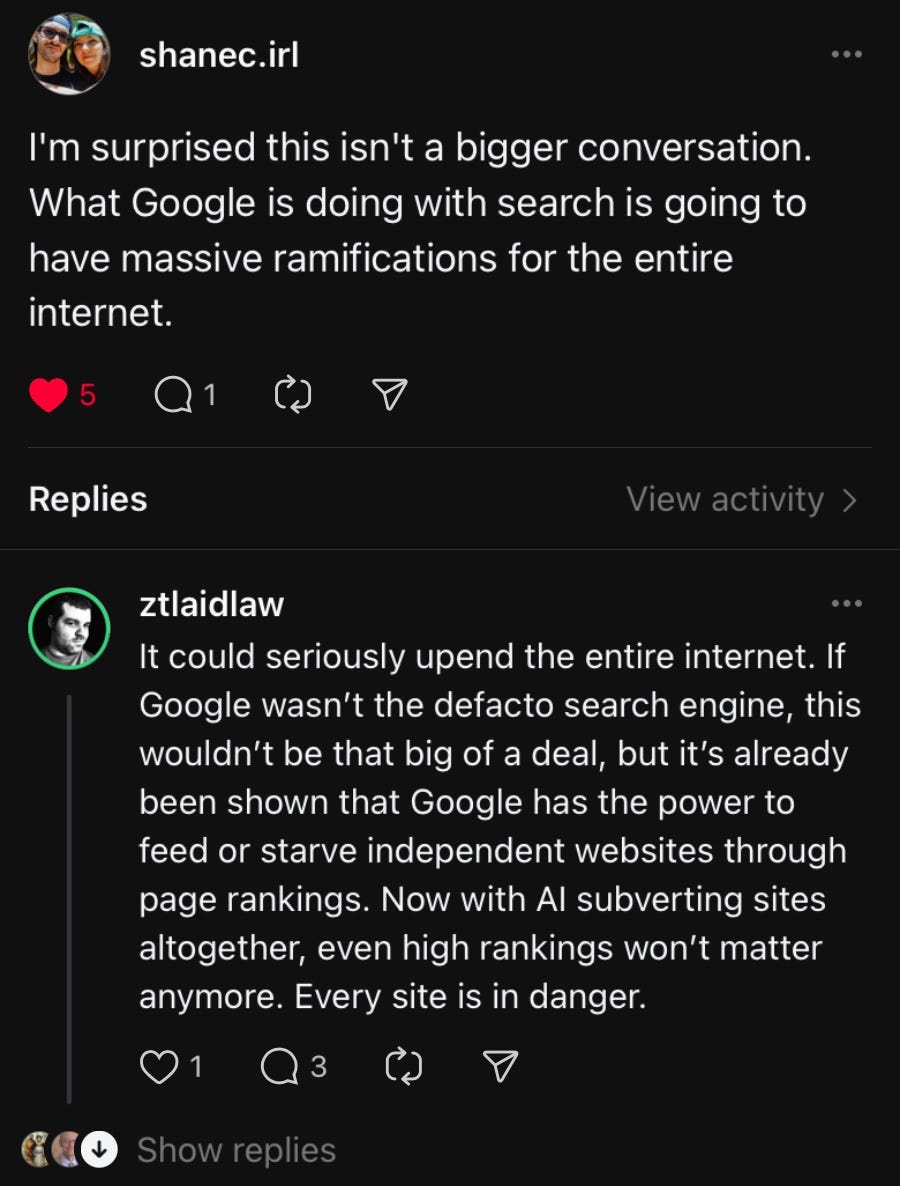Opinion: Google Gemini will destroy the internet
Google has worked hard to accelerate the growth of its AI platform, Gemini. In just several short years, it went from playing catch-up with the likes of OpenAI to baking it directly into every bite of Android, Drive, and more. Now, as its capabilities reach new heights, Google Gemini has its sights set on a new target: eliminating the media industry.
Okay, so maybe Google isn’t trying to tear down the very websites that provide the search results that power Gemini, – at least I don’t think so – but that’s exactly what will happen if things continue down the current path.
Why is Google Gemini a threat to the websites you love?
At Google IO last week, the search giant showcased a series of Gemini features that are coming to its platforms and services this year. Among them were new Android security enhancements, Google Workspace upgrades, and a Google Photo ability called Ask Photos.
Most notable to this discussion, however, is a generative AI search trick that you can try out right now dubbed AI Overview. As the name suggests, this new capability promises to “let Google do the searching for you” by culling data directly from websites and compiling it into a neat little summary that’s easy to read without clicking on a single article or link.
Now, if you’re thinking, “Won’t that cause websites to receive fewer clicks from Google Search results and hurt their bottom lines?” you’re on the right track. However, Google claims that this feature doesn’t harm websites but actually helps them, stating:
With AI Overviews, people are visiting a greater diversity of websites for help with more complex questions. And we see that the links included in AI Overviews get more clicks than if the page had appeared as a traditional web listing for that query. As we expand this experience, we’ll continue to focus on sending valuable traffic to publishers and creators. As always, ads will continue to appear in dedicated slots throughout the page, with clear labeling to distinguish between organic and sponsored results.
Of course, it’s hard to see how this is actually true. Why would anyone click on an article if the answer they’re looking for is sitting right at the top of the search page? Since the feature launched, I’ve personally encountered AI Overview a handful of times when searching random topics, and the AI-generated results were almost always good enough that I got the info I needed, no clicking required. Now extrapolate that out across millions of users and billions of searches per day, and clicks are bound to take a dive.
Biting the hands that feed
The irony of AI Overview affecting click rates is that publishers aren’t the only group who will suffer. Google itself, which earns a large heap of revenue each year through its ad network, needs an open and free internet to survive. A drop in clicks means that Google’s profits will also plummet.
That’s not to say Google will standby idle while its earnings take a hit. To make up for losses, it’s not unreasonable to suspect Google will eventually pack ads directly into Gemini AI Overview. This won’t help struggling websites, of course, but at least Google will get paid (woo hoo!).
The catch-22 switcheroo
Another level of irony to the situation is that Gemini needs the open web in order to comb through published content, pull together summaries of information, and serve it all up in AI Overview. But as Google subverts article clicks and website traffic, your favorite sites will begin to shut down one by one. As this happens, Gemini will have less and less data to cull, eventually muddying AI Overview results until they’re either bad, incomprehensible, or unusable, after which this silly experiment will fail.
The consequences of this exact point came up during a Threads conversation I had with tech YouTuber, Shane Craig. Most regular non-techie Google users who rely on AI Overview won’t even realize their favorite websites are dying until they suddenly disappear.
The truth is that Gemini makes searching the web easier and faster than it’s ever been, and you get expert advice in a quick and concise paragraph that gives you what you need with a dose of instant gratification. It’s brilliant! But each AI Overview summary served is a financial hit to websites that are already scraping the bottom of the ad revenue barrel as it is, and there’s only so much publishers can take before they can’t keep the lights on or pay their staff any longer.
All of AI is coming after the media
Gemini isn’t the only offender, either. AI services like Microsoft’s Bing Copilot and OpenAI’s ChatGPT also siphon data from the internet and serve it up to users without a direct click of monetization back to the sites it was all stolen taken from.
Gemini, however, is still the AI platform that stands do the most damage to media websites and even businesses that rely on customer traffic through search results. As the leading search engine on the planet by miles, Google serves up 3.1 trillion searches per year. Normally, these queries would be met with a series of webpages that can be clicked on, read, and monetized so that websites and Google alike get paid for their expertise and page rankings. With Gemini, though, the middle man (and any rightful profits) get cut out, to creators’ detriment.
AI Overview can’t be disabled, either. Sure, there’s a new “Web” tab on the search toolbar you can use, but that’s at least one or two clicks away and provides less information, making it a nonstarter for most users. As it stands, AI Overview is the way of the future for Google Search.
How to fix Google’s AI Overview mess
The small, fragile silver lining to this mess is that there is a way out, but it’s not easy or even amicable. Here are just a few of the possibilities that could pave the way forward:
First and foremost, Google needs to monetize Gemini search results and pay the proceeds back to the websites that supply data to each query. This is the fair, responsible, and right thing to do, and it’s in the best interests of website publishers, search users, and Google. Everyone gets what they want; case closed.
If Google decides not to treat websites and their content fairly, government-backed legislation is the next likely move. Consider petitioning your local lawmakers; tell them that Google’s AI Overview feature is stealing content from websites, big and small, and must be held accountable, starting with proper compensation to all affected sites.
This one gets messy, but there’s the prospect of a class action lawsuit on the horizon. If publishers and businesses ban together, they can sue Google for income lost due to AI Overview’s negligent theft and copyright infringement.
Next, readers (that’s you) should go back to bookmarking and directly visiting your favorite websites instead of relying on Google to provide answers. With this method, Google still gets ad revenue and your sites get to keep the lights on and pay their staff.
Finally, if you really love the open internet and want websites to thrive, maybe give another non-AI-powered search engine a try — one that still wholeheartedly supports SEO rankings and monetization.
Don’t be evil
There’s no getting around the fact that the company whose slogan used to state, “Don’t be evil,” has just embarked on one of its most nefarious propositions by setting AI Overview out into the public with no regard for how it will impact publishers and even users.
Based on the keynote at Google IO 2024 last week, it’s clear that Google is betting big on Gemini and its swath of features, some of which are more helpful than others. As end users, it’s up to us to hold Google accountable, praising them for features that work and demanding better for the features that are plain evil. Make no mistake — AI Overview in its current form will hurt the internet, publishers, and the writers who are paid to produce content every day.
As a long-time Google user and fan, I don’t think the company launched AI Overview with ill intentions. But after careful analysis, it’s clear that the potential pitfalls are far more egregious than Google considered. Now it’s up to users to speak out and petition for more responsible AI that benefits us all.






